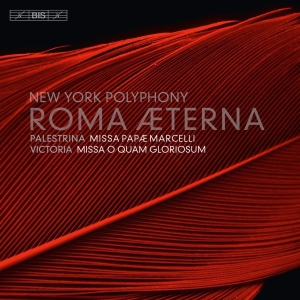
Photo: Chris Owyoung
New York Polyphony sings works by Ivan Moody and Giovanni Perluigi da Palestrina
Miller Theatre’s Early Music series at Church of St. Mary the Virgin
Saturday, January 21, 2017
Sequenza 21
by Christian Carey
NEW YORK – As part of Miller Theatre’s Early Music series, the male vocal quartet New York Polyphony (Geoffrey Williams, countertenor; Steven Caldicott Wilson, tenor; Christopher Dylan Herbert, baritone; and Craig Phillips, bass-baritone) celebrated their ensemble’s tenth anniversary with a concert at Church of St. Mary the Virgin on Saturday, January 21st. Speaking from the stage, the group acknowledged their long relationship with both Miller Theatre and St.Mary’s; they have appeared on a number of concerts curated by Miller and began their association when they were singers in the choir at the church. The concert began with Sicut cervus, a seamlessly beautiful motet by the evening’s star composer, Giovanni Perluigi da Palestrina.
For the occasion, New York Polyphony commissioned a new work that received its world premiere. Ivan Moody’s Vespers Sequence demonstrates his abiding interest in incorporating music and liturgical practices from the Orthodox church into his composition language. In addition to settings in English from Protestant and Catholic liturgies (St. Mary’s is an Anglo-Catholic Episcopal church), the piece featured chant and texts from the Russian, Serbian, and Greek traditions. In his program notes, Moody even provided a connection to Jewish liturgical practices in one of the psalms he chose to set. However, and fittingly for the location, special attention was paid to Marian texts: the piece culminates in a lustrous rendition of Rejoice, Virgin Mother of God, the Byzantine rite version of “Ave Maria.” Moody juxtaposes chant with chords featuring stacked seconds and fifths, which provide the proceedings with a shimmering quality. Another distinctive part of his language is the use of canon and other imitative passages to overlay melodic material into polytonal or polymodal pile-ups, again allowing dissonance to season the chant-inspired atmosphere. It is an often haunting and always elegantly written piece.

Like Sicut cervus, all of the selections on the second half of the concert were by Palestrina; all were also programmed on New York Polyphony’s latest BIS CD, Roma Aeterna. This segment featured the core quartet alongside three additional singers: Timothy Keeler, countertenor; Andrew Fuchs, tenor; and Jonathon Woody, bass-baritone. Clearly there was an affinity among the entire group’s membership; the additional trio’s tone quality and flowing legato fit right in with the New York Polyphony “sound.” Tu es Petrus, a six-part motet, was rendered in exuberant fashion. It was followed by the concert, and the compact disc’s, centerpiece, one of the most famous and beloved pieces of the Sixteenth century: Missa Papae Marcelli by Palestrina. Roma Aeterna is the first recording of this piece of which I am aware to feature countertenors, rather than trebles or sopranos, on the top lines of the mass. Herein lies a choice that changes the entire sound world of the piece. Williams is a countertenor of the alto, rather than male soprano, variety. And while there is little consensus on absolute pitch in the Renaissance, this leads to a transposition of the mass that is lower than the norm. Thus, where one was previously accustomed to bright sonorities and bustling rhythmic activity, New York Polyphony instead accentuated sonorousness, lyricism, and a supple gentleness. They provide an entirely different, and often appealing, version of this masterwork.
The audience’s applause demanded an encore, and the quartet complied, but with a somewhat out-of-season selection: the Christmas folksong “I Wonder as I Wander,” arranged by Williams. While it was well performed, it ended the evening in somewhat curious fashion. I wouldn’t have minded another Palestrina motet or a reprise of Moody’s “O Gladsome Light” in its place.
